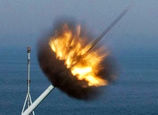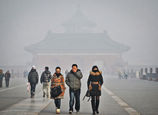
 |
| A man examines an air purifi er in Beijing. During the weekend the capital and other cities in the Beijing-Tianjin-Hebei region were hit by severe air pollution. (China Daily/Zou Hong) |
Emergency plans
In fact, there are no official guidelines or emergency plans specifically designed for schools, although some international schools in Beijing have formulated their own.
Officially, only Beijing and Shaanxi province have announced their own emergency plans for heavily polluted days. Friday's high level of pollution prompted Beijing's municipal government to put its emergency plan, unveiled on Dec 14, into action for the first time.
"Warnings have been released to the public through channels such as micro blogs, television and radio, urging people to reduce the amount of time they spend out of doors and to increase their use of public transport. Schools are being advised to arrange fewer outdoor activities for the kids," said a post on the official micro blog of the Beijing Municipal Environmental Protection Bureau.
It also emphasized that the government will "strengthen law enforcement and the frequency of inspections, ask the relevant plants to reduce emissions and arrange a 30 percent reduction in the use of official vehicles".
According to data released by the bureau on Sunday evening, 54 businesses in Beijing have cut their emissions by 30 percent, 28 construction sites have stopped foundation work, Beijing Hyundai Motor Co temporarily halted production on Sunday and one production line has been suspended at Beijing Cement Plant Co.
While experts praised the warning as timely and precise, they also criticized the preventive measures for being too lax.
"I feel the restrictions on motor vehicles are still too light," said Pan Xiaochuan, a professor at Peking University's School of Public Health. "As the pollution occurred in the weekend instead of during the working week, the use of official vehicles had already been reduced naturally."
Pan emphasized that the current plan has no legal backup. "In some countries in Europe, at least half of the motor vehicles are barred from using the roads on heavily polluted days, according to law," he said.
Zhou Rong, director of the Greenpeace climate and energy project in Beijing, added that the smog has enveloped many provinces and therefore emergency plans employed by individual cities are unlikely to be satisfactory.
"A regional emergency action plan is required," she said. "We can expect a better solution, if the government will is there."



















![]()
